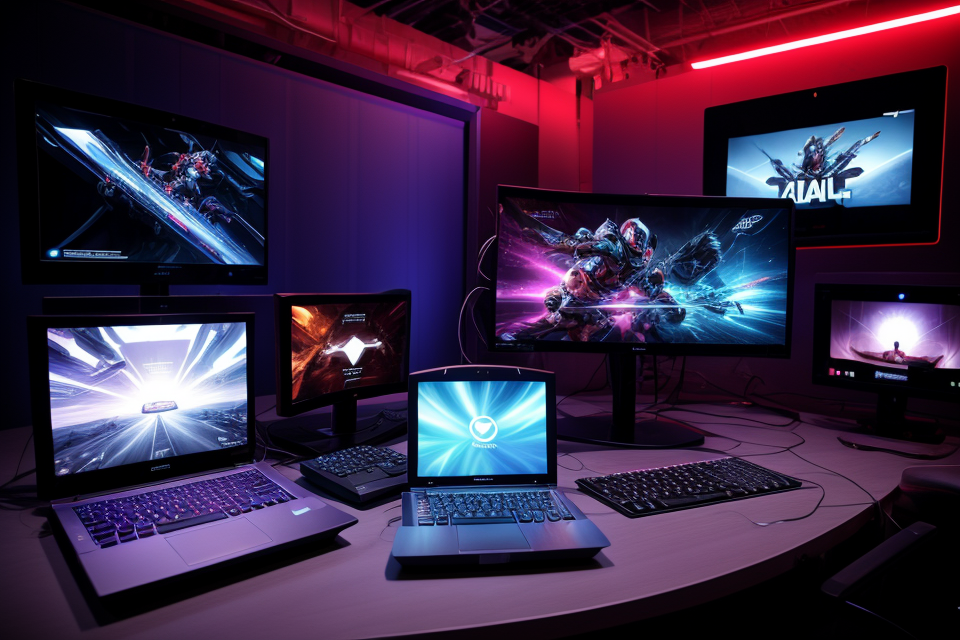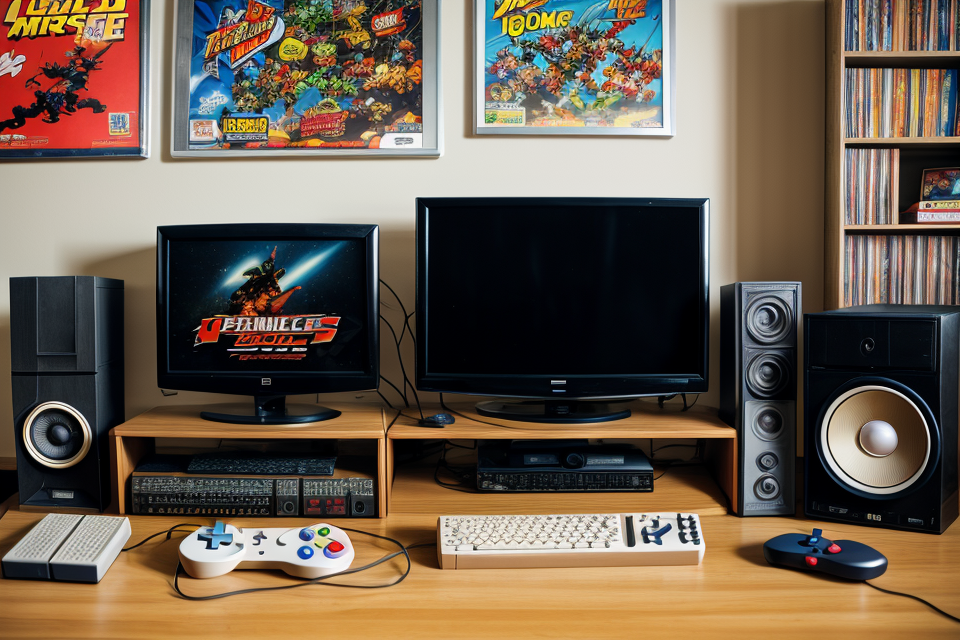
Are you ready to take your gaming experience to the next level but unsure if your laptop can handle it? Don’t worry, we’ve got you covered! In this article, we’ll guide you through the process of determining whether a game will run smoothly on your laptop. From checking the system requirements to assessing your laptop’s specifications, we’ll provide you with all the tips and tricks you need to ensure that you’re maximizing your gaming experience. So, get ready to upgrade your gaming setup and join the ranks of the most skilled gamers out there!
Checking System Requirements
Understanding the Basics of System Requirements
System requirements refer to the minimum specifications that a laptop must meet in order to run a particular game. These requirements can include factors such as the processor speed, amount of RAM, and graphics card performance. It is important to understand these requirements because games are designed to use specific hardware components, and if your laptop does not meet the minimum requirements, the game may not run properly or may not run at all.
Understanding the basics of system requirements is essential for gamers who want to get the most out of their gaming experience. By knowing the specific hardware components that are required to run a particular game, you can make informed decisions about the type of laptop that you need to purchase or upgrade in order to play the game smoothly. This can save you time and money in the long run by avoiding the purchase of a laptop that is not compatible with the games you want to play.
In addition to helping you choose the right laptop, understanding system requirements can also help you troubleshoot any issues that may arise while playing a game. If you experience performance issues or crashes while playing a game, checking the system requirements can help you identify the cause of the problem and determine whether it is related to your hardware.
Overall, understanding the basics of system requirements is a crucial step in ensuring that you have a positive gaming experience on your laptop. By taking the time to familiarize yourself with the specific hardware components that are required to run a particular game, you can make informed decisions about your hardware purchases and troubleshoot any issues that may arise.
Finding System Requirements for a Game
Finding the system requirements for a game is the first step in determining whether your laptop can run it. Here are some typical places to find the system requirements for a game:
- The game’s official website: Many games will have their system requirements listed on their official website. This is usually the most accurate source of information, as the developers will have provided the minimum and recommended specifications for the game.
- Online gaming forums: Gaming forums can be a great resource for finding information about a game’s system requirements. Users will often post their experiences with the game and whether or not they think it’s compatible with their laptops.
- Steam: If you’re planning on purchasing the game through Steam, you can check the system requirements on the game’s Steam page.
When looking for system requirements, there are a few key pieces of information to look for:
- Minimum and recommended specifications: These are the minimum and recommended specifications for running the game. The minimum specifications are the bare minimum that the game will run on, while the recommended specifications are the ideal configuration for a smooth gaming experience.
- Operating system requirements: Some games may only be compatible with certain operating systems, so it’s important to check if your laptop’s operating system meets the requirements.
- CPU, GPU, and RAM requirements: These are the specific components of your laptop that need to meet the game’s requirements. Make sure that your laptop’s CPU, GPU, and RAM meet the minimum and recommended specifications for the game.
By checking the system requirements for a game, you can determine whether your laptop is capable of running it smoothly and avoid any potential compatibility issues.
Comparing Your Laptop’s Specifications to System Requirements
Before purchasing a game or attempting to run it on your laptop, it is important to compare your laptop’s specifications to the game’s system requirements. This will help you determine whether your laptop is capable of running the game at an acceptable level of performance. Here’s how you can do it:
Understanding your laptop’s specifications
To compare your laptop’s specifications to the game’s system requirements, you need to know what your laptop’s specifications are. This information can typically be found in the documentation that came with your laptop or by checking the manufacturer’s website.
The specifications you will need to pay attention to include:
- CPU (Central Processing Unit)
- GPU (Graphics Processing Unit)
- RAM (Random Access Memory)
- Storage
How to compare them to system requirements
Once you have identified your laptop’s specifications, you can compare them to the system requirements of the game you want to play. This information can typically be found on the game’s official website or in the documentation that came with the game.
When comparing your laptop’s specifications to the game’s system requirements, pay attention to the following:
- CPU: The game’s system requirements will list the minimum and recommended CPUs required to run the game. Make sure your laptop’s CPU meets or exceeds these requirements.
- GPU: The game’s system requirements will also list the minimum and recommended GPUs required to run the game. Make sure your laptop’s GPU meets or exceeds these requirements.
- RAM: The game’s system requirements will list the minimum and recommended amounts of RAM required to run the game. Make sure your laptop’s RAM meets or exceeds these requirements.
- Storage: The game’s system requirements will list the minimum amount of storage required to install the game. Make sure your laptop’s storage meets or exceeds this requirement.
By comparing your laptop’s specifications to the game’s system requirements, you can determine whether your laptop is capable of running the game at an acceptable level of performance. If your laptop’s specifications do not meet the minimum requirements, the game may run poorly or not at all. If your laptop’s specifications exceed the recommended requirements, you may be able to run the game at higher settings or resolutions.
Running a Compatibility Test
Introduction to Compatibility Testing
Compatibility testing is an essential step in determining whether a game will run smoothly on your laptop. This step involves evaluating the hardware and software requirements of the game and comparing them to the specifications of your laptop.
There are different types of compatibility tests that you can perform to ensure that your laptop can handle the game. These tests include:
- Minimum system requirements test: This test checks whether your laptop meets the minimum hardware and software requirements needed to run the game.
- Recommended system requirements test: This test checks whether your laptop meets the recommended hardware and software requirements needed to run the game.
- Performance test: This test checks how well your laptop performs while running the game.
By running these tests, you can determine whether your laptop is capable of running the game without any issues or whether you need to upgrade your hardware or software to optimize your gaming experience.
Using Pre-Release Versions of the Game
Using pre-release versions of a game can be a great way to test its compatibility with your laptop before its official release. These versions are usually made available to the public for beta testing, which allows developers to identify and fix any issues before the final release. Here are some advantages of using pre-release versions and how to access them:
Advantages of pre-release versions
- Early access: By downloading pre-release versions, you can play the game before it is officially released, giving you an early advantage over other players.
- Bug reporting: Beta testing allows you to report any bugs or glitches you encounter, which can help improve the overall gaming experience for everyone.
- System compatibility: Testing the game on your laptop can help you determine if it is compatible with your hardware, avoiding potential issues after the official release.
How to access pre-release versions
- Check game developer websites: Many game developers offer pre-release versions on their official websites. Visit the website of the game you’re interested in and look for a section dedicated to beta testing or pre-releases.
- Sign up for beta testing programs: Some game developers offer beta testing programs for interested players. Sign up for these programs to receive invitations to participate in pre-release testing.
- Join gaming communities: Online gaming communities, such as forums and social media groups, often share information about pre-release versions. Join these communities to stay informed about upcoming tests and how to access them.
- Follow game-specific social media accounts: Some game developers share information about pre-release versions on their social media accounts. Follow the official accounts of the games you’re interested in to stay updated on any pre-release opportunities.
Utilizing Compatibility Tools
When it comes to determining if a game is compatible with your laptop, there are several compatibility tools available that can help. These tools are designed to analyze your system and provide you with detailed information about the hardware and software requirements needed to run a particular game.
Some examples of popular compatibility tools include:
- Can I Run: This tool is designed to provide users with a quick and easy way to determine if their laptop can run a particular game. It takes into account the user’s processor, memory, and graphics card to provide a detailed compatibility report.
- GeForce Experience: This tool is designed specifically for laptops with NVIDIA graphics cards. It automatically optimizes your laptop’s settings for the best possible gaming experience, and also provides a compatibility check for over 4,000 games.
- Intel Gaming Center: This tool is designed to work with Intel graphics cards, and provides a range of features to optimize your gaming experience. It also includes a compatibility check tool that can help you determine if a particular game is compatible with your laptop.
By utilizing these compatibility tools, you can get a better understanding of the hardware and software requirements needed to run a particular game on your laptop. This can help you avoid frustration and disappointment by ensuring that the game you want to play is compatible with your system before you even purchase it.
Optimizing Your Laptop for Gaming
Improving Performance through Software Adjustments
Enhancing your laptop’s performance is crucial for an optimal gaming experience. This section will delve into the specifics of improving performance through software adjustments.
- Tips for optimizing performance:
- Close unnecessary background processes: Closing background processes can free up system resources and improve overall performance.
- Disable visual effects: Some visual effects can consume significant resources. Disabling them can help boost performance.
- Manage power settings: Lowering power settings can reduce the strain on your laptop’s resources. This can be done by adjusting settings in the control panel or power options.
- How to adjust settings for better gaming:
- Graphics settings: Adjusting graphics settings can significantly impact performance. Lowering the resolution, turning off anti-aliasing, and reducing texture quality can help improve performance without compromising the gaming experience.
- Game settings: Some games have their own set of performance-related options. Adjusting these settings can also help optimize performance.
- Driver updates: Ensuring that your graphics and other drivers are up to date can help improve performance and fix any potential issues.
By following these tips and adjusting the appropriate settings, you can optimize your laptop’s performance for a smoother and more enjoyable gaming experience.
Upgrading Hardware for Better Performance
When it comes to gaming on a laptop, one of the most effective ways to improve performance is by upgrading the hardware. Upgrading certain components, such as the graphics card or the processor, can significantly enhance the gaming experience and ensure that your laptop can handle more demanding games. Here are some tips on how to upgrade your laptop’s hardware for better gaming performance:
Understanding the impact of hardware upgrades
Before upgrading your laptop’s hardware, it’s important to understand the potential impact on gaming performance. Some upgrades, such as adding more RAM or upgrading the graphics card, can have a significant impact on frame rates and overall performance. Other upgrades, such as upgrading the hard drive or adding a better cooling system, may not have as much of an impact on gaming performance but can still improve the overall user experience.
Suggestions for upgrading components
When it comes to upgrading hardware for better gaming performance, there are several components that you may want to consider upgrading. Here are some suggestions:
- Graphics card: Upgrading your laptop’s graphics card can have a significant impact on gaming performance. Look for a graphics card that is compatible with your laptop and has enough power to handle the games you want to play.
- Processor: Upgrading your laptop’s processor can also improve performance, especially if you’re playing demanding games or running resource-intensive applications. Look for a processor that is compatible with your laptop and has enough power to handle your needs.
- RAM: Adding more RAM can also improve performance, especially if you’re running multiple applications or playing games that require a lot of memory. Look for RAM that is compatible with your laptop and has enough capacity to meet your needs.
- Hard drive: Upgrading your laptop’s hard drive can improve performance by providing faster access to data and applications. Look for a hard drive that is compatible with your laptop and has enough capacity to meet your needs.
- Cooling system: If your laptop gets very hot during gaming or other intensive activities, upgrading the cooling system can help prevent overheating and improve performance. Look for a cooling system that is compatible with your laptop and has enough power to keep your system cool.
By upgrading these components, you can significantly improve your laptop’s gaming performance and ensure that you can enjoy the latest games without any issues.
FAQs
1. How can I determine if a game will run on my laptop?
To determine if a game will run on your laptop, you need to check the system requirements for the game. The system requirements are usually listed on the game’s official website or in the manual. Look for the minimum and recommended specifications for your laptop’s hardware, such as CPU, GPU, RAM, and storage. Compare your laptop’s specifications to the game’s requirements to see if your laptop meets the minimum and recommended specifications. If your laptop’s specifications meet or exceed the requirements, then the game should run on your laptop.
2. What hardware specifications do I need to check to determine if a game will run on my laptop?
To determine if a game will run on your laptop, you need to check the following hardware specifications:
* CPU (Central Processing Unit): The CPU is the brain of your laptop and is responsible for processing the game’s instructions. You need a CPU that meets the minimum requirements specified by the game.
* GPU (Graphics Processing Unit): The GPU is responsible for rendering the game’s graphics and animations. You need a GPU that meets the minimum requirements specified by the game.
* RAM (Random Access Memory): RAM is used to store temporary data while the game is running. You need enough RAM to meet the minimum requirements specified by the game.
* Storage: Storage is used to install the game and its data. You need enough storage to install the game and its data.
3. What should I do if my laptop’s specifications don’t meet the game’s requirements?
If your laptop’s specifications don’t meet the game’s requirements, then the game may not run smoothly or may not run at all. In this case, you have a few options:
* Upgrade your laptop’s hardware: You can upgrade your laptop’s hardware, such as the CPU, GPU, or RAM, to meet the game’s requirements.
* Lower the game’s settings: You can lower the game’s settings, such as the graphics quality or resolution, to reduce the load on your laptop’s hardware.
* Consider a different game: If your laptop’s hardware is not capable of running the game you want to play, then you may need to consider a different game that has lower system requirements.
4. How can I optimize my laptop’s performance for gaming?
To optimize your laptop’s performance for gaming, you can follow these tips:
* Close unnecessary applications: Close any applications that are not necessary while you are playing the game to free up resources for the game.
* Adjust power settings: Adjust your laptop’s power settings to optimize performance. For example, you can set your laptop to high-performance mode or disable sleep mode.
* Use a gaming laptop cooling pad: If your laptop gets hot during gaming, you can use a gaming laptop cooling pad to keep it cool.
* Overclock your CPU and GPU: Overclocking your CPU and GPU can increase their performance, but be careful not to overdo it as it can cause instability and damage to your hardware.
5. Can I play games on my laptop that were designed for desktop computers?
Yes, you can play games on your laptop that were designed for desktop computers. Most modern games are designed to work on both desktop and laptop computers, as long as your laptop meets the minimum and recommended system requirements. However, some older games may not be compatible with laptops or may require additional software or drivers to run properly. It’s always a good idea to check the system requirements for the game before purchasing it to ensure that it will run on your laptop.


